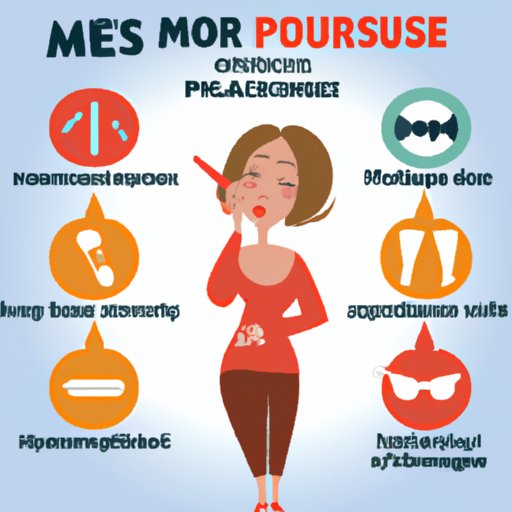
Introduction
Menopause is a natural biological process that marks the end of a woman’s menstrual cycle. While it is a normal part of aging, it can cause a variety of symptoms that can be challenging to manage. It is important to understand these symptoms and how to deal with them to maintain your quality of life as you enter this new phase of your life. In this article, we will cover the ten most common symptoms of menopause, the changes in the body that cause them, and strategies for managing them.
The 10 Most Common Symptoms of Menopause and How to Manage Them
Hot flashes, night sweats, mood swings, sleep disturbances, fatigue, vaginal dryness, weight gain, joint pain, memory problems, and decreased libido are the most common symptoms experienced during menopause. Here are effective tips for managing each symptom:
Hot Flashes
Avoid caffeine, alcohol, and spicy foods. Dress in layers to easily take off clothing when a hot flash strikes. Breathing exercises may also help.
Night Sweats
Avoid wearing tight clothing and keep your bedroom cool. Try relaxation techniques like deep breathing or meditation before bed.
Mood Swings
Get enough sleep, exercise regularly, and consider talking to a therapist or counselor. Practice relaxation exercises such as mindfulness or yoga to help reduce stress levels.
Sleep Disturbances
A consistent sleep routine, avoiding caffeine and alcohol before bedtime, and avoiding electronics for at least an hour before sleeping can help. If sleep disturbances persist, discuss medications with your doctor to see if they would be right for you.
Fatigue
Getting enough sleep and making sure to eat a healthy diet filled with protein and other key nutrients can help fight fatigue. Make sure to take breaks when needed and not overload your schedule.
Vaginal Dryness
A water-based lubricant can help reduce discomfort during intercourse. If symptoms persist, discuss prescription options with your doctor.
Weight Gain
Maintain a healthy weight through regular exercise and healthy eating habits. Focus on eating nutrient-dense foods and avoid crash diets that can have long-term negative effects.
Joint Pain
Regular physical activity plays a significant role in reducing joint pain. Incorporate strength and flexibility exercises into your routine. Also, over-the-counter pain relievers or topical creams can help alleviate pain if necessary.
Memory Problems
Cut down on multitasking and distractions, declutter your environment, and take breaks when needed. Consider learning a new skill or taking part in activities that challenge your mind.
Decreased Libido
Experiment with your partner to find new ways of sexual stimulation. Talk with your doctor to see if testosterone or estrogen therapies would be appropriate.
Menopause: What It Is, What to Expect, and How to Deal with Its Symptoms
Menopause usually happens between the ages of 45 and 55, but it can occur earlier or later in life in some cases. This happens when the ovaries stop producing eggs and estrogen, leading to changes in the body. These changes can be physical and emotional, but the severity of the symptoms vary between women. If you are experiencing severe symptoms, it is essential to seek medical advice and support.
Your Body in Transition: A Guide to the Symptoms of Menopause
Each person’s experience of menopause is different and variable in terms of the intensity of symptoms, which can include hot flashes, night sweats, mood swings, sleep disturbances, fatigue, vaginal dryness, weight gain, joint pain, memory problems, and decreased libido. These symptoms are directly associated with hormone changes in the body.
Hot Flashes and Night Sweats
Hot flashes and night sweats are the most common symptoms of menopause. They occur when there is a drop in estrogen levels in the body, leading to a hypothalamus malfunction. The hypothalamus is the part of the brain that regulates your body temperature. When it malfunctions, it signals blood vessels to produce more heat, leading to flushing, redness, and sweating.
Mood Swings and Sleep Disturbances
Mood swings and sleep disturbances are other common symptoms associated with menopause. They are directly related to hormonal fluctuations. Women have low levels of estrogen and progesterone during menopause which affects the sleep/rest cycle. Estrogen deficiency is also associated with mood alterations, including irritability, anxiety, and depression.
Vaginal Dryness and Decreased Libido
Vaginal dryness and decreased libido are often the most persistent symptoms of menopause. They are caused by the decreasing estrogen levels, which affect the tissue and elasticity of vaginal walls and clitoris. The tissues start becoming dry and thin and lack their elasticity, leading to painful intercourse and decreased sexual desire.
Understanding the Changes: Symptoms of Menopause and Their Causes
The physiological changes that occur during menopause lead to a variety of symptoms. Estrogen, progesterone, and testosterone levels changes lead to physical and emotional changes that can sometimes result in negative symptoms.
Hot Flashes and Night Sweats
Hot flashes and night sweats are caused by the changing levels of estrogen in your body. As estrogen levels fluctuate, it leads to an increase in your hypothalamus’ instability, leading to heat surges which cause flushing and sweating.
Mood Swings and Sleep Disturbances
Mood swings and sleep disturbances are caused by fluctuating levels of estrogen and progesterone. When your ovaries stop producing eggs, these hormonal changes lead to mood swings and sleep disturbances.
Vaginal Dryness and Decreased Libido
The drop in estrogen levels is responsible for vaginal dryness, inflammation, and less elastic tissue, leading to pain and discomfort during intercourse. Hormonal changes may also reduce libido and worsen sexual desire.
The Natural Remedies to Help Manage Menopause Symptoms
Natural remedies can help lessen the symptoms of menopause in some women. However, they should not replace medical advice from a professional. Here are some of the most effective natural remedies reported to ease symptoms:
Herbal Supplements
Black cohosh and red clover may be beneficial in managing hot flashes. Flaxseed may also help reduce vaginal dryness.
Eating a Balanced Diet
Eating a healthy, balanced diet with carbohydrates, fiber, protein, and healthy fats can help ease symptoms such as fatigue, weight gain, and sleep disturbances.
Physical Exercise
Regular physical activity can help reduce joint pain and improve your overall mood. See a specialist or trainer customize a fitness regimen that suits your needs.
Menopause and Healthy Lifestyle Choices: Strategies to Combat Symptoms
Menopause symptoms can be managed by incorporating some healthy lifestyle choices into your routine.
Dietary Changes
Eating a diet that is rich in whole foods is essential in managing weight gain and other hormonal changes. Focus on eating whole grains, legumes, and fruits and vegetables every day.
Regular Exercise
Go for a brisk walk, an early morning jog, practice yoga, or do any exercises that you enjoy to help manage your weight, reduce joint pain, and improve your sleep patterns.
Stress Management
Reducing stress levels by practicing mindfulness, deep breathing, and other relaxation techniques can go a long way in managing any mood swings, irritability or anxiety-related symptoms during menopause.

Getting through Menopause: Tips for Managing Symptoms and Staying Healthy
As you go through menopause, it is essential to prioritize self-care and be aware of changes in your body. Some tips to help you navigate this phase of your life include:
Make Time for Yourself
Set aside time to engage in activities that you love to do, socialize, and relax.
Invest in Good Sleep
Practice good sleep hygiene, avoid caffeine and alcohol before bedtime, and practice relaxing techniques so that you can wake up feeling refreshed each morning.
Be Prepared for Emergencies
As a precaution, carry pads, sanitary products, and an extra pair of clothes for hot flashes.
Conclusion
Menopause symptoms may be uncomfortable, but they can be manageable. Speak to your doctor if you are experiencing severe symptoms or need extra help. Healthy lifestyle habits, natural remedies, and a balanced diet can help you feel your best as your body transitions into this new phase of life.




